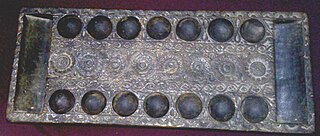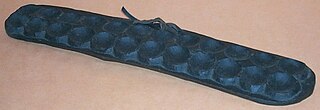
Mancala is a family of two-player turn-based strategy board games played with small stones, beans, or seeds and rows of holes or pits in the earth, a board or other playing surface. The objective is usually to capture all or some set of the opponent's pieces.

Oware is an abstract strategy game among the mancala family of board games played worldwide with slight variations as to the layout of the game, number of players and strategy of play. Its origin is uncertain but it is widely believed to be of Ashanti origin.

Kalah is a modern variation in the ancient Mancala family of games. The Kalah board was first patented and sold in the United States by William Julius Champion, Jr. in the 1950s. This game is sometimes also called "Kalahari", possibly by false etymology from the Kalahari desert in Namibia.

Omweso is the traditional mancala game of the Ugandan people. The game was supposedly introduced by the Bachwezi people of the ancient Bunyoro-kitara empire of Uganda. Nowadays the game is dominated by Ugandan villagers. It is a very hard and fast game said to keep one's mind high and ever excited, which can make it addictive. The equipment needed for the game is essentially the same as that of the Bao game. Omweso is strictly related to a wide family of mancalas found in eastern and southern Africa; these include Coro in the Lango region of Uganda, Aweet in Sudan, ǁHus in Namibia, Kombe in Lamu (Kenya), Mongale in Mombasa (Kenya), Mongola in Congo, Igisoro in Rwanda, and Kiela in Angola.
Ba-awa is a variant of the game of mancala originating in Ghana. Although played in some of the same regions as Oware, it is simpler and in traditional societies is considered a game for women and children. Ba-awa is related to games j'erin and obridjie played in Nigeria. It is also similar to mancala game anywoli played at the Ethiopian-Sudanese border.

Bao is a traditional mancala board game played in most of East Africa including Kenya, Rwanda, Tanzania, Comoros, Malawi, as well as some areas of DR Congo and Burundi. It is most popular among the Swahili people of Tanzania and Kenya; the name itself "Bao" is the Swahili word for "board" or "board game". In Tanzania, and especially Zanzibar, a "bao master" is held in high respect. In Malawi, a close variant of the game is known as Bawo, which is the Yao equivalent of the Swahili name.

Ali Guli Mane is an abstract strategy board game of the mancala family, from Karnataka in South India. It is known as Chenne Mane in Tulunaadu, Akal Patta in North Karnataka and Satkoli (सत्कोलि) in Maharashtra. The name of the game, like that of many mancala games across the world, is simply a description of the board used: it means a "wooden block with holes". It is similar to Pallanguzhi from the neighbouring state of Tamil Nadu. There are also similarities with the traditional Malay mancala game Congkak.
Andada is a traditional mancala game played by the Kunama people of western Eritrea. It closely resembles other mancalas from East Africa such as Enkeshui and Layli Goobalay.
Aw-li On-nam Ot-tjin is a traditional mancala game played by the Penihing people of Borneo. The first transcription of the rules of the game was completed by norwegian ethnographist Carl Sofus Lumholtz. Despite its origin, Otjin is similar to african mancalas such as Ba-awa (Ghana) and quite different than most Asian mancalas.

Ayo is a traditional mancala played by the Yoruba people in Nigeria. It is very close to the Oware game that spread to the Americas with the atlantic slave trade. Among modern mancalas, which are most often derived from Warri, the Kalah is a notable one that has essentially the same rules as Ayo.
Hawalis is a traditional mancala game played in Oman as well as Zanzibar, where it is known as Bao la Kiarabu, with slightly different rules. It is closely related to African mancalas such as Bao, Njomba, Lela, Mulabalaba (Zambia), Muvalavala (Angola) and Tschuba.
Daramutu is a traditional mancala game from Sri Lanka. It was first described in 1909 by the British engineer Henry Parker in his book Ancient Ceylon (1909). Traditionally, the game is only played by women.

Enkeshui is a traditional mancala game played by the Maasai of both Kenya and Tanzania. It is a rather complex mancala game, and bears some similarities to the Layli Goobalay mancala played in Somaliland.
Isolo is a traditional mancala game played by the Sukuma people in northern Tanzania. The rules of the game come in three variants, respectively for women, boys and men.
Kiothi is a traditional mancala game played by the Meru people in Kenya. The word "kiothi" simply means "to place". This mancala is closely related to the Enkeshui and the Giuthi mancalas, respectively played by the Maasai, the Kikuyu and Embu people.
Krur is a traditional mancala game played by the Hassaniya people in western Sahara, along the border of Nigeria and Mauritania, in southern Morocco, in Algeria, in northern Senegal, in Mali and in Niger. It is a children's game, very close to other simple African mancala such as Layli Goobalay (Somalia) and Nsa Isong (Nigeria).
Lamlameta is a traditional mancala game played by the Konso people living in the Olanta area of central Ethiopia. It was first described in 1971 by British academic Richard Pankhurst. It is usually played by men. The name "Lamlaleta" means "in couples".

Layli Goobalay is a board game played in parts of Somalia. It is a variant of the classical count and capture game mancala, which is one of the oldest two-player strategy board games played throughout the world. Layli Goobalay means "to exercise with circles" in the Somali language.
Mbothe is a traditional mancala game played by the Pokomo people that live along the Tana River, in Kenya. Pokomo do not traditionally build gameboards; they dig pits in the ground and use small stones as counters.
La'b Madjnuni, also known as Crazy Game, is a mancala game played in Damascus (Syria) in the late 19th century.








